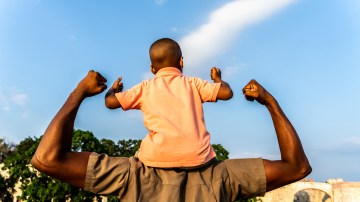Let the Boys be Boys: Stop Pushing Premature Manhood on Our Children
I never told the full truth when people asked me what I wanted to be when I grew up

Rear view of a father with his son flexing muscles outdoors
I never told the full truth when people asked me what I wanted to be when I grew up. The only thing I really wanted to be was grown. I knew better than to say that though. My entire childhood had warned me against it. When I eavesdropped on my mom’s chats, I was told: “Stay out of grown folks’ conversation.” If I popped too much when I danced, I was being fast. Even something as small as the wrong nail polish color could come with a reprimand: “Stop trying to be grown.”
Womanhood is not a battle easily won. I’ve achieved the archaic, patriarchal markers of getting married and having children and I still can’t pinpoint when I started feeling like a woman.
It took me having a son to realize that while girls have to strive toward womanhood, the same is not true for boys and their manhood.
At three-years-old, my son already calls himself a man.
I can see how he came to this conclusion. From infancy, he’s been his grandfather’s “little man,” his father’s “bro.” It’s endearing but I wonder if this default manhood leaves boys struggling to define what manhood truly is by the time they’re ready for the title.
We know all about the adultification that happens to Black children in the school system, by the criminal justice system and society at large. But there are ways our own intra-communal behaviors contribute to this phenomenon. Licensed marriage and family therapist Lamonte Coke explained why members of the Black community might use this language.
“You want to say, ‘What’s up, lil man?’ because you want them to be tough, to be confident, to be able,” Coke explained. “You don’t necessarily say, “What’s up little softie?” But that’s what they are. What’s up, scary? What’s up, nervous? That’s the reality of a baby.”
Instead of placing these monikers on the children, it’s more realistic to make a distinction, allowing the boy to remain a child and the man to model healthy, adult-like behaviors.
“Call them my baby boy,” Coke says.
Putting the label of man on a boy doesn’t allow the child to lean into the inherent softness and vulnerability of this stage.
“That’s why it’s hard for little boys to cry and be sensitive and emotional,” Coke said. “We don’t have a lot of Black men that nurture that.”
I’d argue that as a society, we’re all a little unclear about what manhood is in the first place. This confusion has led to the all too frequent discussions about the “high value man.” It’s responsible for the ways in which men are still struggling to adjust to women– and particularly Black women– in positions of power. It shows up in the repetitive conversations we have around gender roles. Calling boys men only adds to the confusion.
“If you’re called a man, you’re not even given a chance to develop as a boy,” Coke said.
Furthermore, the premature label isn’t rooted in anything real.
For so many, manhood is based on false conceptions like money and sexual prowess. Boys who’ve been labeled men are susceptible to these traps. Boys who define masculinity through wealth may do dangerous things to acquire it. Even when money is earned righteously, problems arise if they are ever without it.
“What happens when you don’t have money? Then what are you now?” Coke asks. “You didn’t understand what a man truly is. The foundational components of a man are not what his bank account looks like. That’s not what creates a man.”
The boys who believe sex makes them men are easy targets for sexual abuse at the hands of older individuals. Instead of recognizing this dynamic as abusive, a child with a warped sense of manhood can believe romance is characterized by manipulation and brokenness.
In a society that struggles to define manhood outside of external influences and toxicity, we should allow Black boys the chance to enjoy childhood. If we assign labels too quickly it adds unnecessary pressure to be something that may not be who our children really are. The entire community suffers as a result.
Usually, boyhood idioms are used to allow boy children and even grown men to evade accountability and fairness. But when it comes to the way we label the Black boys in our families and communities, I’m going to evoke one we might want to reframe: Let the boys be boys.



